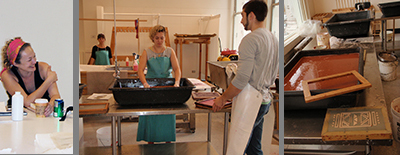Maggie Puckett (MFA 2011) is back at work in the InterArts paper studio after only a short time away. She’s here for fall 2012 semester teaching the papermaking course component of Thinking Through Making, a required core series of courses that combines intensive studio immersion with thinking and writing on art history and contemporary critical theory.

Only a few months out of the InterArts graduate program, Puckett is making waves in contemporary art circles. She’s published an article, “Handpapermaking in the Time of Climate Change,” in the summer 2012 issue of Hand Papermaking magazine; exhibited in both Water: Threats and Possibilities, at HumanThread Gallery (March 9 – April 1, 2012) and The Natural World at Swell Gallery in West Dundee, IL. And, her thesis project Anthropocene has been purchased by Smith College, Savannah College of Art and Design, University of California at Santa Barbara, and Dartmouth College.
She’s enjoying her time teaching TTM, but will pick right up on her own projects as soon as the fall semester ends. “I have two projects in the works right now that I can’t wait to get back to. The first is an artists’ book that visually represents a cross-section of my homeland of Southern California, as if a strip of the region was sliced out and made into a book. I’ll create the piece using handmade paper to show the spans of different habitats, from the deep sea Abyssalpelagic zone 4,000 meters deep, through the water column towards kelp forests, intertidal zone, estuaries, scrubland, meadows, woodland, to the top of Palomar Mountain of the Peninsular Ranges (1,800 meters high), and down to the Anza Borrego desert just a few meters above sea level.”
Puckett describes her second project as more political, exploring militant groups and the effects of Western imperialism. “Both projects are currently works in progress, and I am still working out the messages. But both will show connections between environment, natural resources, and politics.”
For more information about Maggie Puckett, click here. For more information on TTM and the InterArts program, click here.


